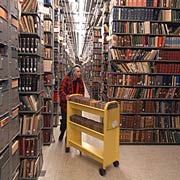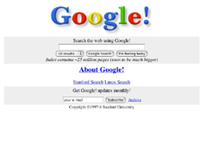Read New York Times Article
In an article in yesterday’s NY Times, Alberto Manguel compares the Genesis story of Babel and the library at Alexandria with their alleged modern-day counterpart–Google’s commitment to digitize all human knowledge. Are we constructing a modern-day tower of Babel? A monument to the hubris of what might be possible if we could just get a little smarter. Will Google help us find answers to the big questions: where did we come from, and what’s the meaning of it all? I went online to find out. I Googled the question “What is the meaning of it all?” and got the following:
Category Archives: Libraries, Search and the Web
enter the cybrarian
 The recent buzz surrounding Google’s library intitiative has everyone talking about the future of research, which inevitably raises the question: how will the digitization of library collections change the role of the librarian? I would guess that, far from becoming obsolete, their role will in fact be elevated in importance, if not necessarily in status. They could very well come to be our indispensible guides through the labyrinth – if perhaps invisible, engineering behind the digital walls.
The recent buzz surrounding Google’s library intitiative has everyone talking about the future of research, which inevitably raises the question: how will the digitization of library collections change the role of the librarian? I would guess that, far from becoming obsolete, their role will in fact be elevated in importance, if not necessarily in status. They could very well come to be our indispensible guides through the labyrinth – if perhaps invisible, engineering behind the digital walls.
It’s also important to consider the question of visualization. When you run a search on Google you are given an enormous list. This is already deeply ingrained in the day-to-day business of finding information. But these lists are basically the electronic equivelant of scrolls, with the items algorithmically determined to be most relevant placed at the top. But sooner or later we have to admit that using scrolls for this kind of business is ludicrous. There has to be a better way of arraying these vast harvests of information in a way that allows the researcher to zoom across degrees of specificity and through associative chains of context and meaning. I see no reason why a search shouldn’t take place in some kind of virtual library, emulating the physical architecture of research settings, and allowing for some of the associative or accidental echoes that so often enrich a paper trail blazed through a brick-and-mortar library. Or cannot knowledge resemble a tree, or an arterial matrix? Must we be bound to the scroll?
Returning to the question of the librarian’s role, I recalled this passage from James J O’Donnell’s 1996 paper The Pragmatics of the New: Trithemius, McLuhan, Cassiodorus:
“The librarians of the world have, moreover, already led the way, for academics at least, into the new information environment, not least because they are caught between rising demand from their customers (faculty and students) and rising supply and prices from their suppliers, and so have already been making reality-based decisions about ownership versus access, print versus electronics, and so on. In short, they are just now our leading pragmatists. Can we imagine a time in our universities when the librarians are the well-paid principals and the teachers their mere acolytes in a distribution chain? I do not think we can or should rule out that possibility for a moment”

Related articles:
“Questions and Praise for Google Web Library” – NY Times
“Google’s library plan ‘a huge help'” – USA Today
“Making books readable on computer proves trying task” – USA Today
Also, I found this on Searchblog. For a trip down memory lane, check out the original Google in the Stanford archives (click on picture to right). Unfortunately, although it seems interactive, a search just brings up a bunch of stylesheets.
google and big brother
Can Google remain true to its promise to “do no evil,” now that it has shareholders to worry about, advertisers to please, and an ever-increasing reach into the repositories of human knowledge? Google still gives you that warm and fuzzy feeling. It’s got the goofy name, those cute seasonal tailorings of its masthead, the lava lamps. And this is not to mention the various amusing pastimes – the “Google Whack” game in which you try to find two words that cohabit only one of the search engine’s eight billion web pages; or every writer’s guilty pleasure, the Googling of the self, the “auto-Google,” that delicious act of cyber-onanism.
But where might it lead? One day, when I open my fridge, might a sensor not read my searching eye and know that I am looking for milk? And knowing that I have run out, suggest an array of retailers who might be able to replenish my supply? Could Google come to mediate every exchange of information, no matter how inane, or how carnal?
Or could it come to resemble something like the Central Intelligence Corporation in Neal Stephenson’s Snow Crash – a cross between the CIA, the Library of Congress, and DARPA’s “Total Information Awareness” program?
MercuryNews.com | 12/14/2004 | Does Google move augur commercialization of libraries?
books behind bars – the Google library project
How useful will this service be for in-depth research when copyrighted books (which will account for a huge percentage of searchable texts) cannot be fully accessed? In such cases, a person will be able to view only a selection of pages (depending on agreements with publishers), and will find themselves bombarded with a variety of retail options. On a positive note, the search will be able to refer the user to any local libraries where the desired book is available, but still, the focus here remains squarely on digital texts as simply a means of getting to print texts.
Absent a major paradigm shift with regard to the accessibility and inherent virtue of electronic texts, this ambitious project will never achieve its full potential. For someone searching outside the public domain, the Google library project may amount to nothing more than a guided tour through a prison of incarcerated texts. I’ve found this to be true so far with Google Scholar – it turned up a lot of interesting stuff, but much of it was password protected or required purchase.
article in Filter: Google — 21st Century Dewey Decimal System (washingtonpost.com)
NYPL ebook collection leaves much to be desired
I just checked out two titles from the New York Public Library’s ebook catalog, only to learn, to my great astonishment, that those books are now effectively “checked out,” and cannot be downloaded again by anyone else until my copies time out.
It boggles the mind that NYPL would go to the trouble of establishing a collection of electronic titles, only to wipe out every advantage offered by digital texts. In fact, they do more than simply keep the ebooks on the level of print, they limit them further than that, since there are generally multiple copies of most print titles in the NYPL system.
The people responsible for this catalog have either entirely failed to grasp the concept of infinitely accessible, screen-based books, or they grasp it all too well and are trying to stunt it at its inception, perhaps out of fear of extinction of the print librarian. More likely, they are under heavy pressure by a paranoid copyright regime. Whatever the reason, the new ebook catalog shows a total lack of imagination and offers nearly no tangible benefit for the reader.
Beyond that, the books themselves are poorly designed and unpleasant to read. My downloaded copy of Conrad’s Heart of Darkness (which, by the way, I found in the “Romance” section) evidences no more than ten minutes worth of design work, and appears to be simply a cut-and-pasted ASCII file from Gutenberg with a garish graphic slapped on the cover. My copy of Chain of Command by Seymour Hersh was a bit more respectable – more or less a pdf facsimile of the print edition.
On an amusing note, the “literary criticism” section is populated almost entirely by Cliff’s Notes.
3,000 electronic titles at new york public library
This is the third Times article this week on e-books. What’s happening?
“Libraries Reach Out, Online”
No Need to Click Here – we’re just claiming our feed at Feedster
